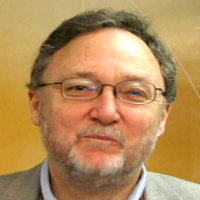
A Florida State University researcher already recognized as one of the world’s foremost authorities in the field of materials science is adding another top honor to his collection.
David Larbalestier, the director of FSU’s Applied Superconductivity Center, has been selected to receive the Cryogenic Materials Award for Lifetime Achievements 2007 from the International Cryogenic Materials Conference (ICMC). He will be presented with the award during a meeting of the conference on Tuesday, July 17, in Chattanooga, Tenn.
"I have been going to the International Cryogenic Materials Conference for more than 30 years and have reported some of our best work at these biennial meetings," Larbalestier said. "So it is a special pleasure to be recognized so distinctively by this ICMC award. And it is very fitting that several of my students and collaborators are presenting papers at this meeting, continuing the tradition of reporting our latest work at the ICMC. I look forward to continuing to be a part of the ICMC at many future meetings!"
Larbalestier is viewed by many of his peers as the leading researcher in the United States, and possibly the world, in the basic research of practical superconducting materials for magnets and power applications. Over a 35-year career, he has profoundly influenced the development of high-field magnets for high-energy physics and other applications, such as magnetic resonance imaging (MRI), that have evolved from them. Among the highlights of his career is his election in 2003 to the prestigious National Academy of Engineering.
In 2006, after more than two decades at the University of Wisconsin in Madison, Larbalestier agreed to move the Applied Superconductivity Center to FSU, where it would work as a new division of the National High Magnetic Field Laboratory.
FSU speedily made major renovations to the Frank Shaw Building across the street from the magnet lab to house all the tools, equipment and apparatus Larbalestier and his team of researchers brought from Wisconsin. After a few months of downtime, they are back to making progress on unlocking the secrets of superconductivity, which can lead to much greater efficiency in the flow of electrical current, resulting in faster computers and more efficient MRIs, to name just a few of the advances possible with these new materials.
"It’s a wonderful challenge because the materials themselves are very complicated," Larbalestier said. "They require discovery, synthesis, analysis. You have to understand where every atom goes. You need wonderful techniques of fabrication. You need very secure theoretical understanding, which we have here in the center. They require microscopy of the highest order, which again we have here in the center, and we are very pleased that FSU has made a major investment in our personnel and facilities."
The International Cryogenic Materials Conference is one of the world’s top organizing bodies for researchers working with cryogenic magnetic materials, structural materials, non-metallic materials, materials testing, mechanical properties of materials used in cryogenic applications, and low-, intermediate- and high-temperature superconductors.



